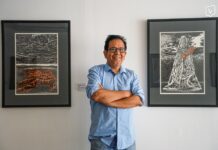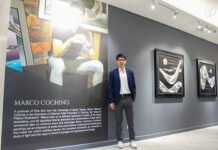UNTRIED, untested, and unstaged, but tackling risky topics that people do not dare talk about.
These words best describe the nine one-act plays written by both aspiring and veteran playwrights in the eighth Virgin Labfest at the Cultural Center of the Philippines’ Studio Theater, June 27 to July 8.
Em Mendez, who studied BS Psychology in UST, and Chuckberry Pascual presented their one-act plays titled Ang Unang Regla ni John and Alejandro, respectively. Both plays tackled homosexuality.
Mendez’s Unang Regla tells of John, a boy who faces identity crisis as a result of his hyper-macho family. While fascinated by women, John does not look at them the way his brothers do. In a dream, a show girl tries to seduce him, but to no avail, making him realize that he in fact wants to become a woman. When he notices pubic hair growing around his penis, John desperately tries to shave it and in the process cuts himself. With the blood oozing, he experiences “menarche,” his first menstrual period. The play is set in the family’s decrepit barber shop that’s on the verge of bankruptcy.
On the other hand, Pascual’s Alejandro revolves around the love story between Gabriel, a homosexual, and his boyfriend, Alejandro. On the seventh year of their relationship, Bree, as Gabriel is known, looks back at the past and argues with himself whether Alejandro loves him for what he is or only for his money. In the lobby of a motel, Bree impatiently waits for his boyfriend while witnessing other couples trysting. The motel’s janitor tries to seduce Bree and, rejected, tells him of his relationship with the motel’s homosexual guard and offers insights on Bree’s relationship with Alejandro. Their discussion is interspersed with the music and lyrics of pop musician Lady Gaga’s Alejandro.
Meanwhile, Andoy Ranay, an alumnus, directed Dingdong Novenario’s “Digital Divide,” the story of a mother who finds out that her daughter has been accepted to an elite school. The family, she thought, was about to escape from the phenomenon known as the “digital divide,” where the poor remain poor because of their inaccessibility to information and technology. But ironically her daughter’s acceptance to the school was hindered by the fact that they were poor.
Other one-act plays were Maynard Manansala and U. Z. Eliserio’s Symposium, Aizel abilan’s Pagsubli, Mar Anthony dela Cruz’s Hayop, Reuel Molina Aguila’s Isa Pang Soap Opera, Mixkaela Villalon’s High Stakes, and GuelanLuarca’s Mga Kuneho.
The festival also presented the full-length play, Totong Hilot, written by J. Dennis Teodosio, only the second in the history of the Virgin Labfest.
Also presented were three entries from last festival—Rae Red’s Kawala, Floy Quintos’ An Evening at the Opera, and Dingdong Novenario’s Kafatiran.
A two-week writing fellowship for young aspiring playwrights was also held at the CCP Conference Hall.
Communication Arts senior Francisco Gian Paulo Cabuena and Asian Studies junior Ma. Kristina Magno were among the 10 college students who got fellowships to the playwriting clinic.
Cabuena submitted I and We, a revised version of Comfort Zone, which won third place at the Dulang May Isang Yugto category of last year’s Ustetika campus literary contest, organized by the Varsitarian. The story tells of a man, Kris, who’s afraid to get out of his comfort zone—which is his gay alter-ego, Andrew. His girlfriend Angela is furious when she finds out about his real identity and “kills” Andrew.
Meanwhile, Magno submitted excerpts from her plays, Pula, Berde, Asul at Dilaw na Mga Lobo, about reincarnation, and Gluttony, which tells the story of a voracious eater who eats everything, even himself. Pula, Berde was given an honorable mention in last year’s Ustetika. At the end of the program, her revised work, Sequel, about a woman waiting for her lover inside a restaurant, was given a dramatic reading.













